‘Dyslexia Is My Superpower’: How Learning Differently Helped Richard Branson Become a Rule-Breaking Billionaire

- Oops!Something went wrong.Please try again later.
- Oops!Something went wrong.Please try again later.
Sir Richard Branson has a knighthood, a Caribbean island, a rocket and several billion pounds to his name, but he still thinks of himself as a bit of a rebel. Once, when I went to interview him in his Swiss chalet, Britain’s best-known entrepreneur padded down the steps to meet me in his socks. This time, we speak by Zoom and the 71-year-old is wearing a faded orange T-shirt that looks identical to one my teenage son owns. He is in Morocco at his kasbah in the Atlas Mountains—tanned, of course, and with hair bleached by the sun. When he turns his camera off he sounds exactly—eerily—like Tony Blair. He is definitely more Cool Britannia than Little England.
Branson may have 400 companies in his Virgin group, running everything from gyms to planes and even a bank, but he has never been a suit-and-tie kind of businessman. In the ’70s, his record company signed the Sex Pistols and he is happier leaping from planes or hanging out with supermodels than staring at numbers in the boardroom. Having dropped out of school at 15, he lived for years on a houseboat because he couldn’t afford a house—he called it the Duende, which means “the power to attract through personal magnetism and charm.”
More from Robb Report
Virgin Atlantic Just Unveiled Its Most Spacious Business Class Suites Yet
Meet the 'Dream Chaser,' the Supersonic Space Craft Taking on Blue Origin and Virgin Galactic
Richard Branson Is Opening His Next Luxury Hotel on a UNESCO World Heritage Site in Spain
He has always been a brand as much as a businessman—a disrupter who loves to “tilt at big companies,” as he puts it. He still thinks of himself as an outsider rather than part of the corporate establishment and tells me that he has learned over the course of his long business career that “it is possible to be a David versus a Goliath and pay the bills at the end of the year.” Last week, he visited Ukraine and met Volodymyr Zelensky—the epitome of the plucky underdog—and saw some of the sites of Russian attacks since Vladimir Putin’s “appalling invasion” began.
Branson prides himself on taking up new challenges and is always pushing himself to the limit, whether flying around the world in a hot-air balloon or beating Elon Musk into space. “I hate saying no; I’m known as Dr Yes,” he explains, and he is convinced that his positivity is one of the secrets of his success. “I think being an optimist is a hell of a lot more fun than being a pessimist. As a leader, it’s so much better to look for the best in people, to praise people and generally be positive. That brings the best out of people.”
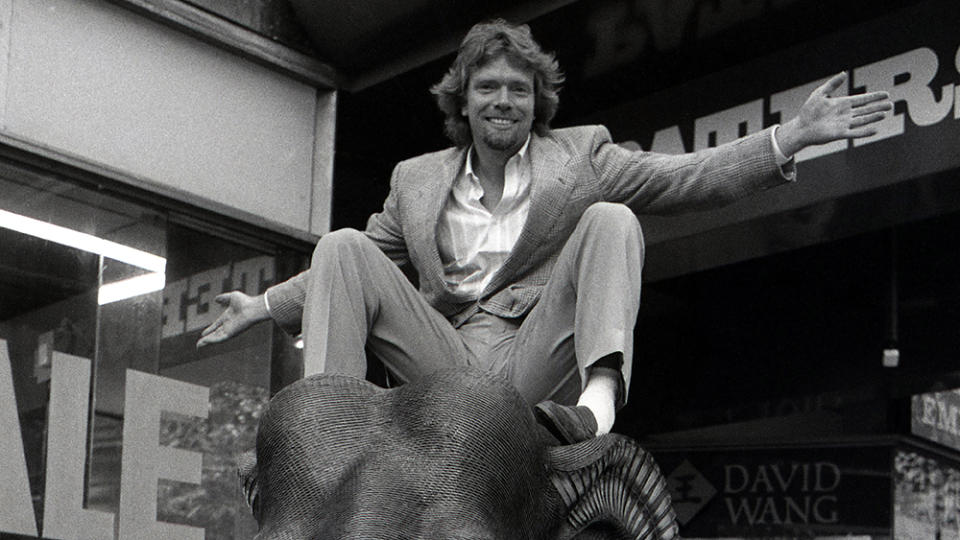
Getty
There have, he admits, been some close shaves. He has almost died 75 times as result of his daredevil escapades, and flirted with financial ruin on more than one occasion. “But life has been a hell of a lot more fun because I’ve said ‘yes’ rather than ‘no.’ When I was 16 I brought out a magazine called Student and on the back I printed, ‘The brave may not live forever, but the cautious do not live at all.’ I’ve lived by that mantra ever since.”
Branson admits that things could have turned out very differently. On the day he left Stowe—the independent boarding school he attended until he was 15—the head teacher told him he would either end up a millionaire or in prison. That turned out to be an accurate prediction. By the age of 22, he had not only set up his magazine but had also opened a chain of record stores, Virgin Records, and founded the empire that would make his name.
A few years later the headmaster sent him a letter asking him to sponsor a new girls’ dormitory at the school. “I wrote back saying, ‘Yes, if you name it after my company,’” Branson tells me. The school decided that “Virgin” was not the most appropriate name to have emblazoned above the door of the female sleeping quarters. “I heard nothing more from him for another 10 years, and then he said how much he regretted not just saying yes. He was good enough to acknowledge that the boy had done OK. There’s much that needs to be done so that schooling can be adapted to the individual rather than the ‘one size fits all’ approach that currently happens.”
Despite making billions from business for over more than 50 years, Branson points out that he would still be considered a failure by an education system that defines success purely in academic terms. He is severely dyslexic but was not diagnosed until his twenties, long after he had left school. Once, when he was about eight, he did an IQ test and recalls with amusement, “I don’t think I filled in anything.” His earliest memories of education are “looking at a blackboard and just seeing mumbo jumbo and relegating myself to the back of the class, so I could at least try to look over somebody else’s shoulder to see if I could get some marks, but having no understanding of what was going on and longing for breaktime so I could go out and play.” He remembers the frustration of struggling to read and write. This was the late ’50s, before dyslexia was widely recognized. “I would jumble things up. People just assumed that we [dyslexics] were stupid. I was definitely bottom of the class.”
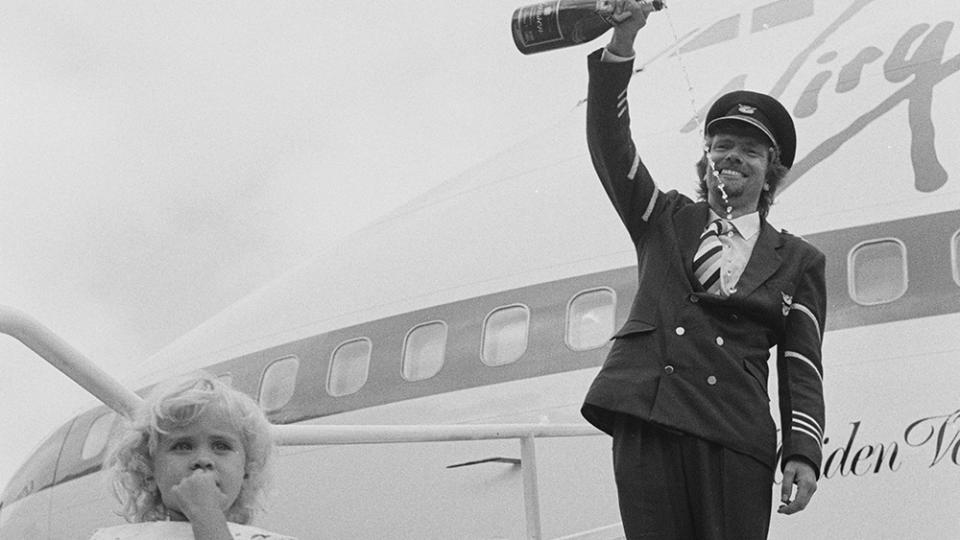
Terry Disney
There were some moments of real cruelty and humiliation. “I got beaten for not performing. In those days it was pajama bottoms down and a stick. Those are unpleasant moments for any kid, but for me, it was strangely the best thing that happened to me. It meant that at 15 I decided that the world needed a magazine run by young people, aimed at young people, that could say we don’t want to waste our time just having a completely exam-orientated society—we should be taught things that are relevant and interesting.”
For years, Branson believed that his differently wired brain was a disadvantage but now he sees his dyslexia as a “superpower” that has given him an edge in business and in life. “If something really interests me, I can excel at it,” he says. “The fact that I was dyslexic meant that, from a very young age, I found fantastic people to surround myself with. It taught me to delegate. I think that, by and large, dyslexics are more creative and good at seeing the bigger picture. We do think slightly differently to other people.”
As an employer, Branson actively seeks out other dyslexics, and he is working with the charity Made By Dyslexia to encourage other businesses to understand the benefits of neurodiversity. Around 40 percent of top-earning CEOs are dyslexic, according to a 2019 survey, and LinkedIn recently added “dyslexic thinking” to its recognized list of skills. Within days, more than 10,000 people had included it in their profiles. “I have a grandchild who’s just been diagnosed as dyslexic and I was able to ring him up and celebrate and say, ‘It’s something that you and I have got that the rest of the family doesn’t have,’” Branson says. “What I tell parents is, work out what your child is really good at and let them follow that path, and the rest will catch up. Let them excel at the things they enjoy.”
During the pandemic he spent time on Necker Island, his Caribbean home, giving his grandchildren the kind of education he wishes he’d had. “We said, ‘There’s a scarlet ibis over there,’ and then we went on the internet and found out all about the scarlet ibis and how they’d been wiped out in the British Virgin Islands a hundred years ago, then recently reintroduced, and how if a scarlet ibis breeds with a white ibis you get a pink ibis. Then we moved on to flamingos and giant tortoises. We were just getting out and about looking at things that are relevant and exciting. And sadly the conventional school educational system doesn’t really do that.”
He insists that schools should recognize different qualities and talents in children. “We need an education system where every young person is set up to thrive in life, and not just thrive as a result of having good exam marks. The Virgin Group no longer asks people for exam results and I think other companies should do the same. One should talk to people about their personality, about what’s going on in the world, how good they are going to be at motivating and inspiring people.” His children Holly and Sam (with his second wife, Joan, to whom he’s been married since 1989) have set up a charity, Big Change, to campaign for education reform.
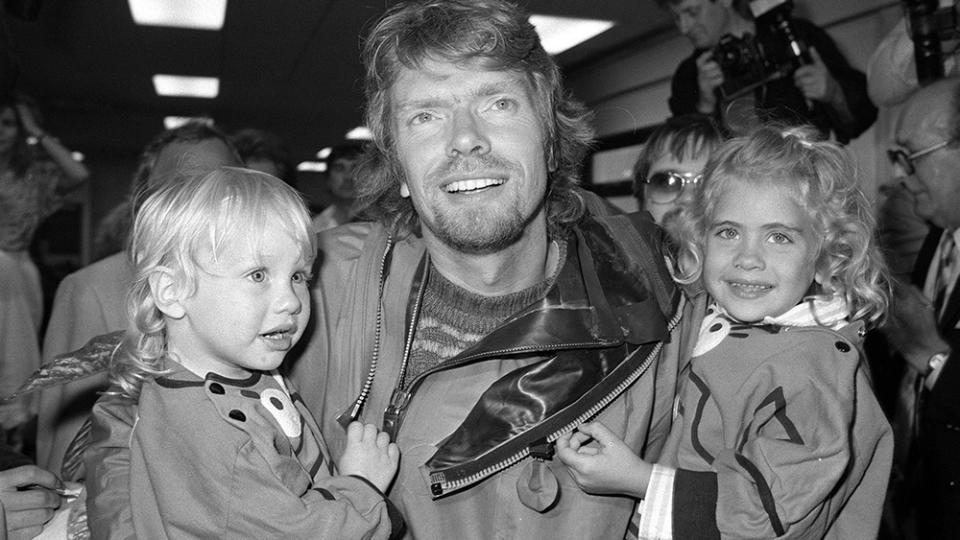
PA Images
Branson does admit that there was one time when his dyslexia almost killed him. “I had to learn to skydive when I was trying to fly around the world in a hot-air balloon. I jumped, and in a very typical dyslexic way, I pulled the lever that got rid of the parachute, not the one that opened the parachute.” Luckily, there was somebody else coming down beside him. “He had watched where my hand was going, and he did a little bit of a Superman dive in, and managed to pull the spare chute, so saving me.”
Nor has he ever been very good at company accounts. “I was 50 years old when I was having a board meeting, and by then we had maybe the largest private group of companies in Europe, and I asked the question, when somebody gave some figures, ‘Is that good news or bad news?’ One of the directors took me out of the room and said, ‘Richard, I’ve known you for years now, I’ve never really dared ask you, but am I right in thinking you don’t know the difference between net and gross?’ And I said, ‘Well, I’ve never been able to admit it, but yeah, that’s the case.’ He pulled out a sheet of paper, and he had some crayons and he colored the piece of paper blue and he said, ‘That’s the sea.’ Then he put a fishing net and some fish in the net, and he said, ‘The fish that are in the net, that’s your profit at the end of the year, and the rest of the sea is gross turnover.’ I have name-dropped net and gross ever since. I realized that Virgin’s net worth is nowhere near as big as I thought it was.”
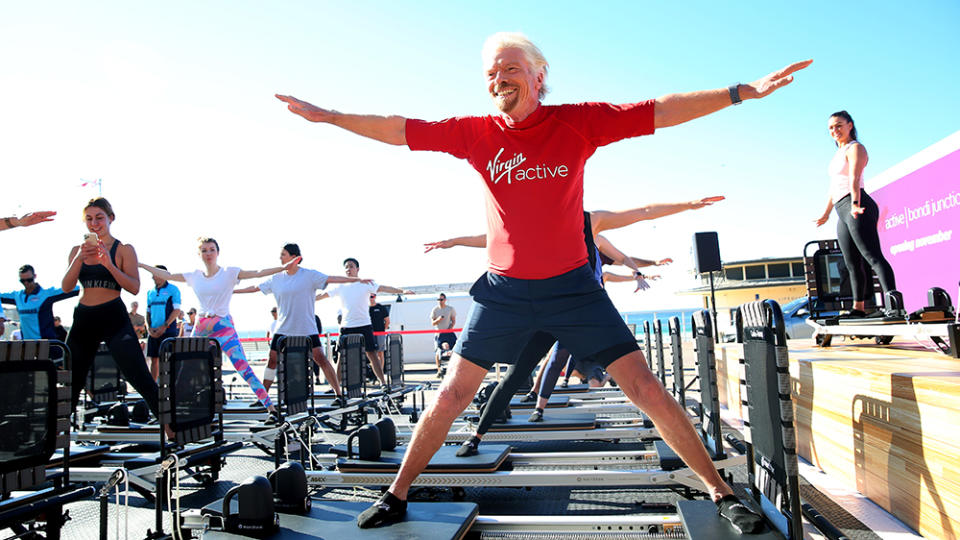
Don Arnold
Yet, Branson is convinced that his dyslexia has made him a better businessman because he has an original perspective, is more innovative and willing to take risks. “I’ve never seen myself as an entrepreneur; I’ve seen myself as a creator. I’m not really interested in making money per se; I’m interested in the things that I create surviving. It doesn’t really matter if you failed elementary maths, as I did at school all those years ago. Somebody else can add up the figures. I’ve just got to deliver a product that exceeds expectations. Take Virgin Atlantic—38 years ago we flew with one second-hand 747 across the Atlantic. Everybody thought we were mad. We were taking on British Airways with 300 planes. . .If I’d gone to the accountants and asked them to do some figures to see whether it was a good idea to go into the airline business, they would have told me, ‘You’ll never survive.’”
Branson was born in 1950 in Blackheath, southeast London, the son of Ted, a barrister, and Eve, a former actress, ballet dancer and air hostess. His mother, who died last year from Covid at the age of 96, was an enormous influence as well as his first investor. “She found a necklace and handed it in to the police, but nobody claimed it, so she sold it for £100 and gave me the money to help me get the magazine up and running.” From an early age she encouraged her son to be independent. “She shoved me out of the car aged five or six and told me to make my own way to Granny’s house, which was four or five miles away. She would have got arrested today, but I survived and I’m grateful to her for making us stand on our own two feet from a young age.”
Even as a schoolboy, Branson had an entrepreneurial zeal, although his first business ventures were a disaster. “I had heard that budgerigars bred enormously quickly, and so I bought a few pairs of budgerigars, and you could buy 1,000 tiny little Christmas trees for £3, and if you waited 5 years, when they were 6 feet tall, you could get a good return. The Christmas trees got eaten by bunnies, and somehow or another rats got in and ate the budgerigars—or my mother let them out, because she got fed up with feeding them when I was away, I’m not quite sure. They were both abject failures.” But, he insists, “We need to embrace failure. There are so many entrepreneurs who failed once or twice before they went on to become really successful, and you learn an enormous amount from failure.”
His record stores thrived and he used the money to found a music label. The Sex Pistols were one of the first bands he signed and he admits that the recent re-release of God SAVE the Queen for the Platinum Jubilee made him nostalgic for his rock’n’roll days. “I don’t look back a lot, but the Sex Pistols really propelled Virgin from being a hippy company into being a punk company that then attracted the Rolling Stones and Peter Gabriel and Genesis. It was a brief whirlwind of a time with the Sex Pistols involving everything from court cases for Never Mind the Bollocks, Here’s the Sex Pistols to rides down the Thames where the police raided the boat, and lots of headlines attacking the Pistols, which of course played right into their hands, and their record sales soared. It taught me a lot about the promotion and marketing of a product.”
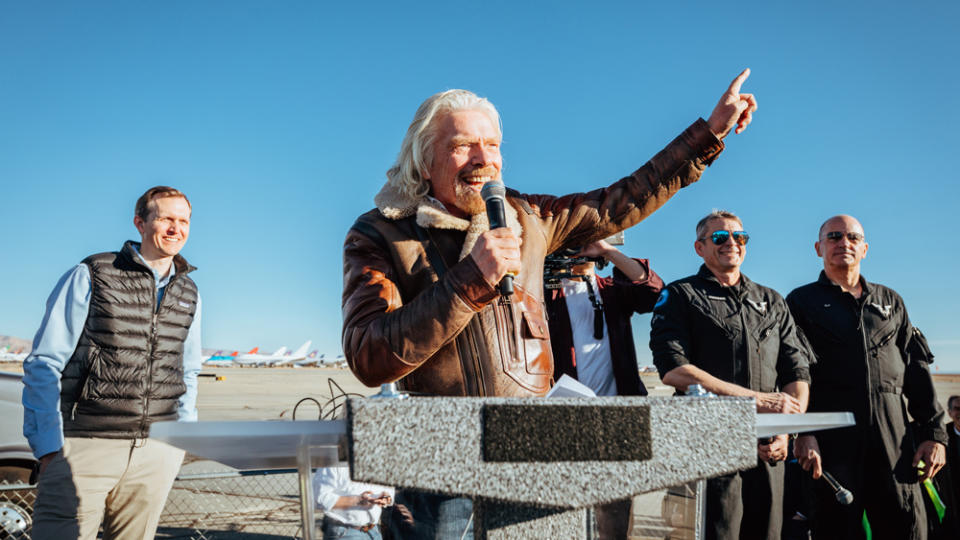
Courtesy of Virgin Galactic
There is, he realized, no such thing as bad publicity. When Virgin was prosecuted for displaying the word “Bollocks” in a Nottingham record store window, Branson mounted an ingenious defense. “I rang up Nottingham University’s linguistics expert and told him the problem and he said, ‘What a load of bollocks. They obviously think that bollocks is a derivative of balls. It’s nothing to do with that. Bollocks was the nickname given to priests in the 18th century, so the album really should mean, “Never mind the priests, here’s the Sex Pistols.”’ I couldn’t believe my luck and said would he mind coming along to court to tell the story? And he said, ‘Look, I happen to be a priest myself. Would you like me to wear my dog collar?’ So we had this linguistics expert in his dog collar, and the judge reluctantly found us not guilty.” The Sex Pistols were “charming” to the priest. “John Lydon and the others were just nice lads having a really fun time.”
Branson admits there is a very thin line between success and failure and there have been some occasions when he came very close to being on the wrong side of that dividing line. Does he think he is just very lucky? “I think it’s partly personal resilience, it’s partly just surrounding oneself with fantastic people, and if you have a great group of people, you can enjoy the good times and you can help each other get through the bad times together. Obviously, Covid was a torrid time, we were in all the wrong businesses, but having a fantastic group of people just putting our heads down, determined to prove the critics wrong, all the Virgin companies came out ahead.”
The economic situation is looking even rockier now. In many ways, it is back to the ’70s, with widespread disruption caused by strikes, and flares back in fashion. “It’s obviously sad to see what’s happening in the world right now,” Branson says. “I fought hard against the Vietnam War and the Iraq war and the Libyan war. . .Seeing Russia in Ukraine makes me want to weep. And the effects of that have been devastating on the price of oil for everybody, and therefore the cost of living.” But he warns that there is another factor which is making things particularly tough in the UK. “Obviously, Brexit’s had a negative effect, and not being part of the common market is going to affect people in Britain much more than they realize. It’s already affecting people enormously in Britain. Our companies overseas are doing a lot better because they can trade more freely with Europe.”
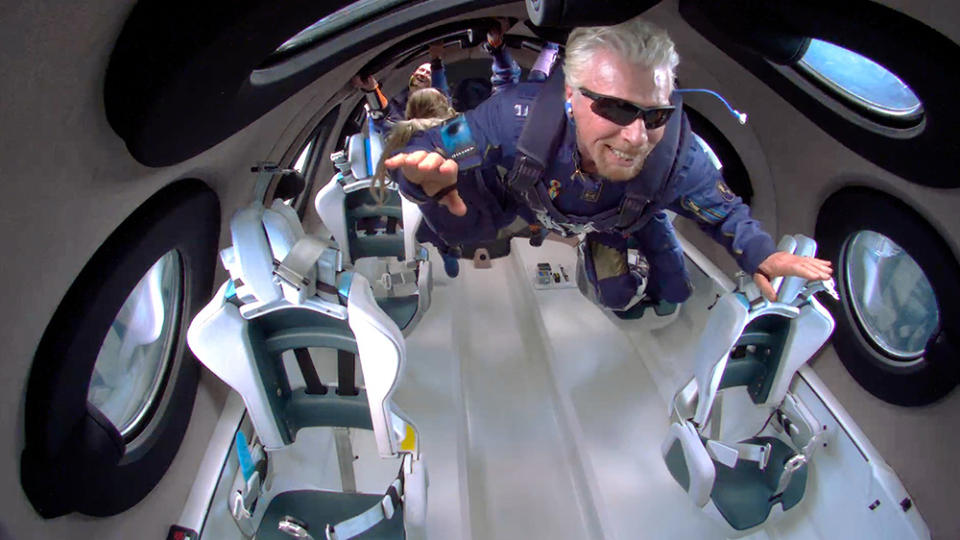
Virgin Galactic
In over five decades as a businessman, Branson has been to Chequers and had dinner with at least eight prime ministers. He has always avoided being tied to a particular political party or tribe—he was Margaret Thatcher’s “litter tsar” in the ’80s and was put forward for his knighthood by Tony Blair in 2000 for “services to entrepreneurship.” But he clearly finds the lack of long-term thinking in Westminster frustrating. “It’s tough being a politician, I mean really tough—you’re in your job for two or three years, you’re minister for education for a couple of years, then you’re minister of something else, and so by the time you’ve learnt it, you seem to be moved on. I’ve been 55 years traveling the world in business, and I’ve learnt an incredible amount in that time, so I think businesspeople can sometimes see situations more clearly. . .Politicians need to be receptive and good listeners. That’s a very important skill for any leader to have.”
There are rivalries in business as well as in politics. Last year Branson was caught up in a “battle of the billionaires” race to space with Elon Musk, but he insists they are on good terms now. “He’s a friend. When I woke up to go to space that day, he was there with his baby in the kitchen, which was very sweet. Rivals should be friends in the evening but competing hard in the day.” Going to space was, he says, “the most extraordinary day of my life, the biggest ‘pinch me’ moment. Every second was [the fulfillment of] a dream which I’d had since being a teenager, watching Neil Armstrong and Buzz Aldrin and standing there, looking up at the moon, and realizing they were standing on the moon, as a kid it was just extraordinary.”
Three of his five grandchildren were there to watch him blast off. “All the grandkids had incredible things to say. Etta [who is 7] thinks I was once a pirate dumped on Necker Island years ago by other nasty pirates, and she pulled me down to her and whispered in my ear just before I went, ‘Papa, do you know you’re going to be the first pirate ever to go into space?’ Lola, who’s three years old, said, ‘Papa, you come back for me.’ It was just too magical. I’m a Peter Pan fan and to be floating in space looking back at this incredible Earth that we live on was mind-blowing.” Branson will turn 72 this month but the boy who never grew up has no plans to retire. “I’ve been incredibly blessed—blessed with dyslexia, blessed with faults, blessed with positive things as well. Not everything has worked out how I planned it, but I can’t think of anything that I would want to change. I’m just learning all the time and life is so fascinating as a result.”
Sign up for Robb Report's Newsletter. For the latest news, follow us on Facebook, Twitter, and Instagram.

